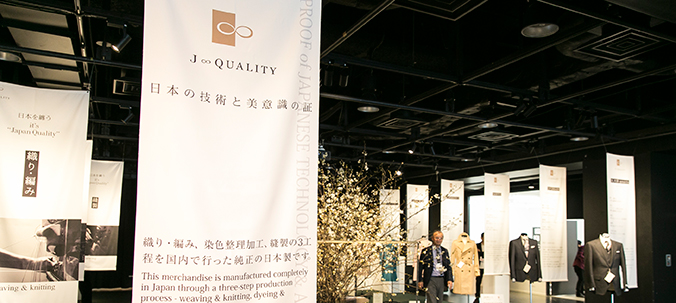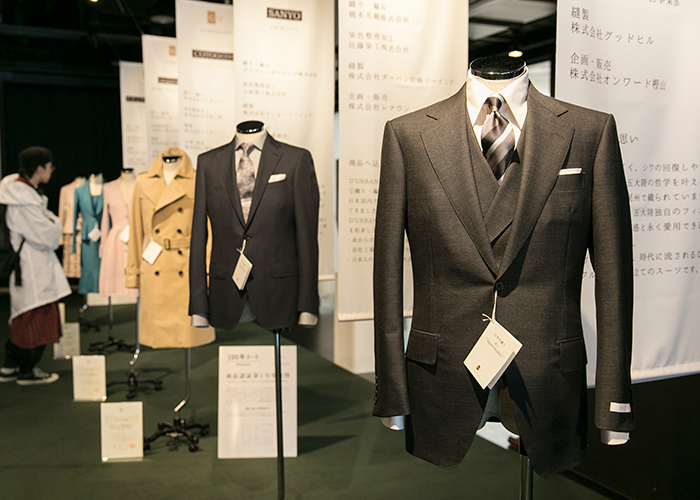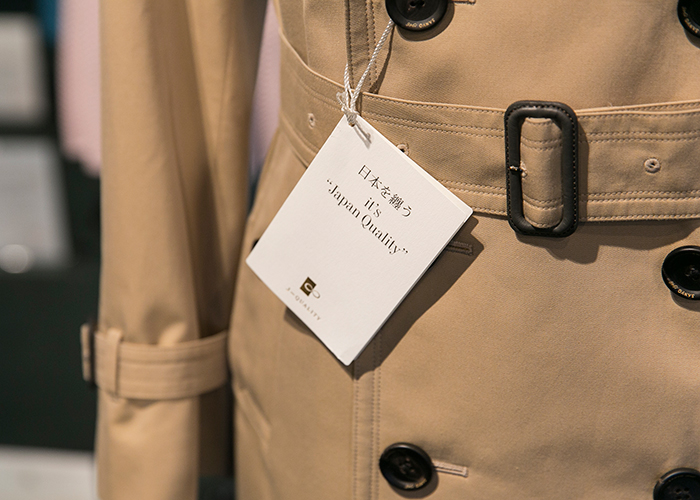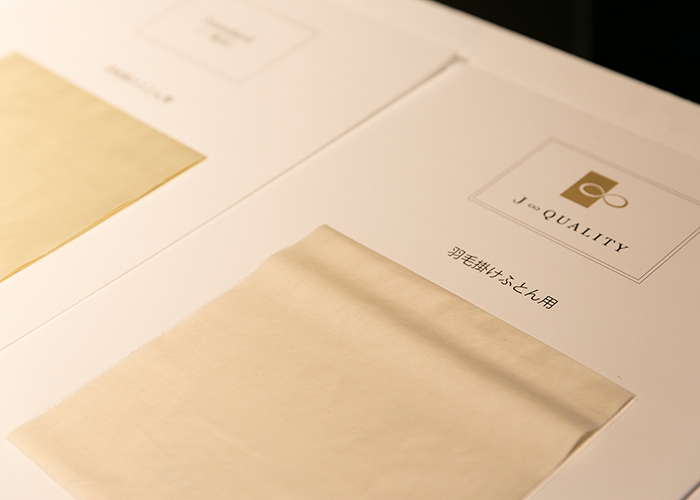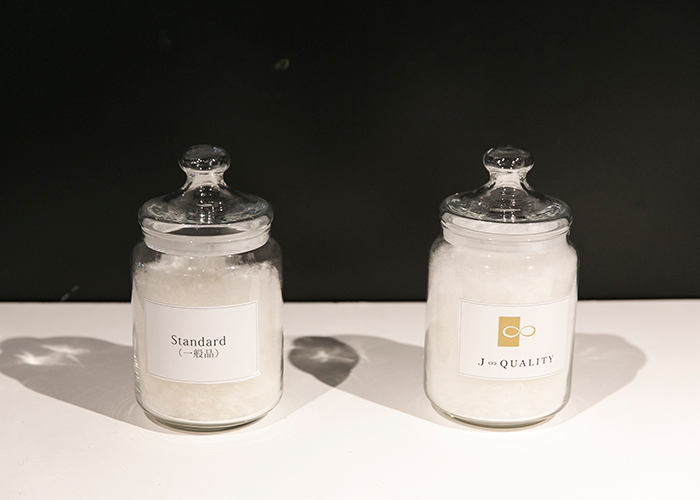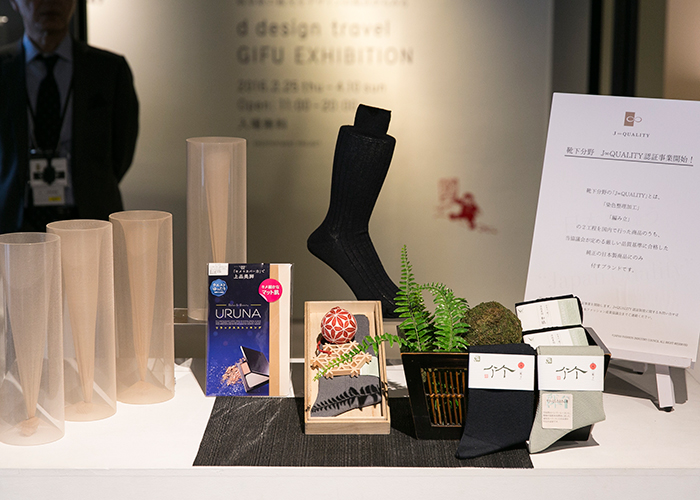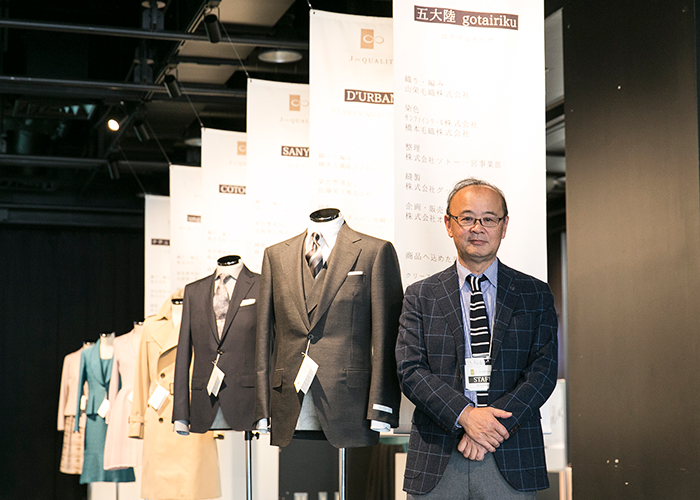“J∞QUALITY” Exhibition -standardised brand to prove all-made-in-Japan products-
MBFWT 2016 A/W [RELATED EVENTS - Other]
“J∞QUALITY”, established on February 2nd, 2015, is a standardized brand which guaranties that a particular product is fully ‘made in Japan’, from ‘weave/knit’, ‘dye/processing’, to ‘garmenting’, under the high quality manufacturing techniques and finished, with the care of a master craftsman.
During the Mercedes-Benz Fashion Week TOKYO 2016 A/W session, an exhibition to introduce the operation of “J∞QUALITY”, a standardized brand which guaranties that a product is fully ‘made in Japan’, was held at the 8F COURT of Shibuya Hikarie, for three days, between March 15th through the 17th. Here is a report on the exhibition, including an interview with Mr. Takahito Miyahara, of the “J∞QUALITY” office.
“J∞QUALITY” is an operation, in which apparel product manufacturers and retailers have joined hands in attaching products which are fully produced in Japan, from “weave/knit’, ‘dye/processing’, to ‘garmenting’, and certified by the Japan Fashion Industry Council, with a standardized brand logo, thereby clearly indicating pure domestic production. Compared to the former “MADE IN JAPAN” brand which did not have a clear guideline on the interpretation of domestic production, this aims to establish the logo as a brand, appealing true ‘made in Japan’ in the Japanese market.
Despite the fact that domestic textile manufacturers possess high quality manufacturing techniques, due to the deflation after the burst of the bubble economy, and the depreciation of the yen bringing on rigid price competitions, production places have been moved to China and Southeast Asia, where labor costs are low. In the early 1990’s half the apparel products sold in Japan were made domestically, but as of 2013, the share of domestic production has decreased to a mere 3.2%. On the other hand, the unrivalled techniques that domestic manufacturers possess, have continued to receive high appraisal from around the world, and utilized in many luxury brands.
Unfortunately, such realities of the industry is unknown to consumers. With such circumstances in the background, “J∞QUALITY” was created as a new scheme to clearly convey which products are made with the exquisite skill, quality, sensibility of such manufacturers.
The exhibition consisted of 3 sections, namely, an exhibit of “J∞QUALITY” certified products, a panel exhibit of “J∞QUALITY” certified company list, and an introduction of a new certification system, involving bed and bedding/socks field.
In the “J∞QUALITY” certified products section, certified products from a total of 6 brands were exhibited, including “gotairiku” suits by ONWARD KASHIYAMA Co., Ltd., “COTTO” sweaters and “SANYO” 100 years coats by SANYO SHOKAI LTD., “Natural Beauty” jacket and dress by TOKYO STYLE CO., LTD., “Soir” set-up formal by Tokyo Soir Co., Ltd., “D’URBAN” suits by RENOWN INCORPORATED. For each products, the certified company that was responsible for each process of “weave/knit”, “dye/processing” and “garmenting” was indicated and identified clearly.
In the panel exhibit of “J∞QUALITY” certified companies, the latest 500 certified companies involved in the 3 production processes were indicated on a map, upon a panel.
In this exhibition, it was announced that bed and bedding/socks would be added as a new “J∞QUALITY” certification field, in addition to the apparel field.
In bedding, certification will start towards futons, sheets and bed spreads filled with natural materials. In the case of futons, certification criteria will be items made with textiles “woven/knit”, “dye/processed” and “garmented” domestically, filled with stuffing which has undergone fluff processes such as dust removing and selection domestically, and finished domestically.
In the case of socks, certification will start towards socks, tights, pantyhose, etc. Certification criteria will be items made by 2 domestic processes of “dye processing” and “knit”.
Both the bed and bedding field and socks field will commence application in April, 2016, with items to be sold in the market from 2016 A/W.
Starting in 2015, “J∞QUALITY” entering its second year, is continuing to enlarge its list of certified companies/products, with an aim to create a domestic value-added market and revitalization of textile production centers, to gather the technological strength and imaginations of Japanese textile/apparel industries as an all-Japan project. Furthermore, in cooperation with the Japan Gloves Industrial Association, they are in the process of creating a guideline for the gloves field, scheduled to commence within the 2016 fiscal year.
Interview
“J∞QUALITY” Executive Office, Acting Secretary-General
Mr. Takahito Miyahara
Japan Fashion Industry Council
Presently, among the products that have the ‘made in Japan’ tag, there are products that “woven/knit”, “dye/processing” are done overseas, and only “garmenting” done in Japan. However, in the case of “J∞QUALITY” products, brand certification is given only to fully domestic products which, in addition to being made with “weave/knit”, “dye/processing”, “garmenting” products that have passed the councils strict quality standards, all steps of “planning” and “marketing” must be done domestically also.
In products that carry the “J∞QUALITY” brand, you can find not only the delicate techniques unique to Japanese manufacturing, but also a story behind its creation. 20 years or so ago, 50% of apparel was fully produced domestically, but today, this has decreased to a mere 3.2%. And with this, financial difficulties of companies of Japanese production centers and a lack of successors, the Japanese fashion industry is presently faced with many difficult problems. Through “J∞QUALITY”, we hope to have domestic apparel companies use good quality domestic textiles, thereby revitalize production centers, and increase the 3.2% rate of domestic production, little by little. In this past year, acknowledgement of the brand has grown, with 500 certified companies, and the number of registered brand products that will be on the market this spring, has doubled. From now-on, we hope and intend to work towards spreading acknowledgement among consumers.


